National Black Law Enforcement group backs Georgia-Israel police exchange program
In rebuke to Jewish Voice for Peace’s antisemitic “Deadly Exchange” campaign, The National Organization of Black Law Enforcement Executives reiterates support, while Georgia Council on American Indian Concerns rejects “anti-police and anti-Israel false claims”
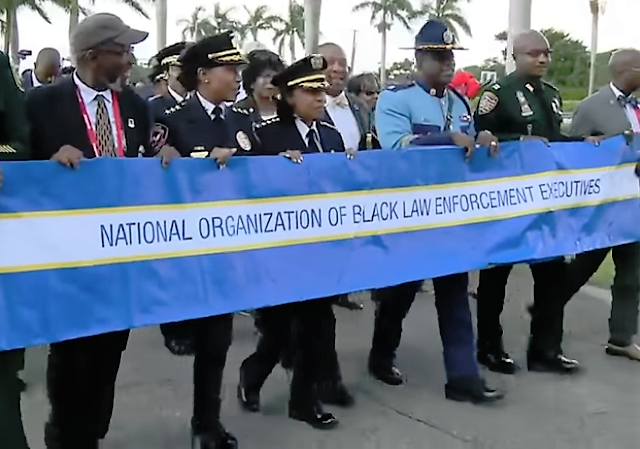
The National Organization of Black Law Enforcement Executives (NOBLE) and the Georgia Council on American Indian Concerns (GCOAIC) have issued statements condemning the virulently anti-Israel and undeniably antisemitic campaign known as “Deadly Exchange”.
That campaign, led by the anti-Jewish and anti-peace extremist organization ‘Jewish Voice for Peace’ (JVP), calls to shut down U.S. police department trainings with their counterparts in Israeli law enforcement. It falsely blames Israel and American Jewish organizations, including the Anti-Defamation League (ADL) and the Jewish Institute for National Security (JINSA), for U.S. domestic policing practices and problems in America’s minority communities.
The two statements by the NOBLE and GCOAIC (see here and here) are in addition to a resolution adopted last week by a local government body that “flatly rejects” JVP’s “Deadly Exchange” campaign. The statements are also similar to those that have been issued in recent weeks by multiple law enforcement organizations and professional associations of police leaders (for a full list click here), Georgia police groups slam Jewish Voice for Peace’s antisemitic “Deadly Exchange” campaign.
The NOBLE statement, issued by a nationally known police organization, doesn’t specifically mention “Deadly Exchange”, but it does express its full support for law enforcement exchange programs, including with Israel, because of the ways that they “improve public safety.” However, the GCOAIC statement, issued by a Native-American group based in Georgia, explicitly opposes the “anti-Israel false claims” made against U.S.-Israel police exchange programs by those who view them as “deadly exchange.” So, each of the statements in their own way lend further support from law enforcement and local community experts to prior criticisms that have been leveled at this obnoxious JVP campaign, including by academics who are otherwise staunch critics of Israel.
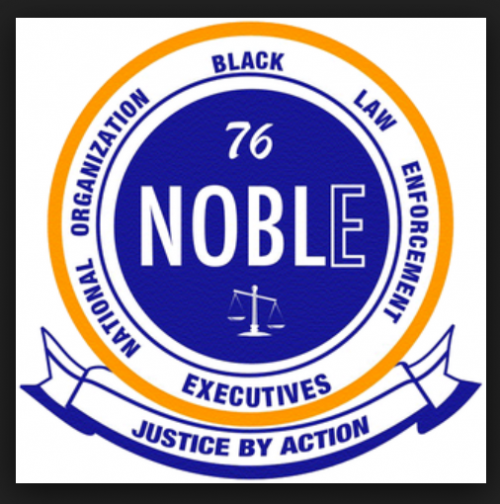
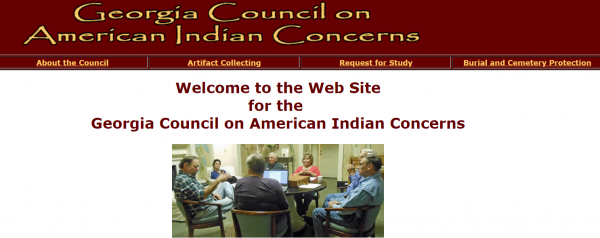
The NOBLE and GCOAIC statements are also particularly significant because they were issued by organizations and councils working on behalf of American minority groups. As a result, even more than the other statements that have so far been issued, these two essentially challenge the basic narrative of “Deadly Exchange” that JVP and its allies are trying hard to promote, namely that U.S. minority groups are being harmed by Israel and its Jewish-American supporters and so these minorities should oppose both the Jewish state and Zionist organizations by endorsing BDS (boycott, divestment, and sanctions).
Bottom line: the NOBLE and GCOAIC statements can be very useful in the effort to combat the “Deadly Exchange” campaign that is now well underway at the municipal level (and is increasingly moving onto American campuses) precisely because they invalidate the key premises of this vile initiative.
Background: Jewish Voice for Peace’s “Deadly Exchange” campaign
In numerous prior posts we’ve written about “Deadly Exchange”, which aims to exploit preexisting and unrelated domestic racial tensions to stoke hatred of Jews by blaming Jews, all in the service of building an anti-Israel coalition:
- With “Deadly Exchange” Campaign, Jewish Voice for Peace moves from enabling to promoting antisemitism
- Jewish Voice for Peace doubles-down on antisemitic “Deadly Exchange” campaign
- Anti-Semitic campaign to blame Jews and Israel for U.S. police practices towards minorities shifts into overdrive
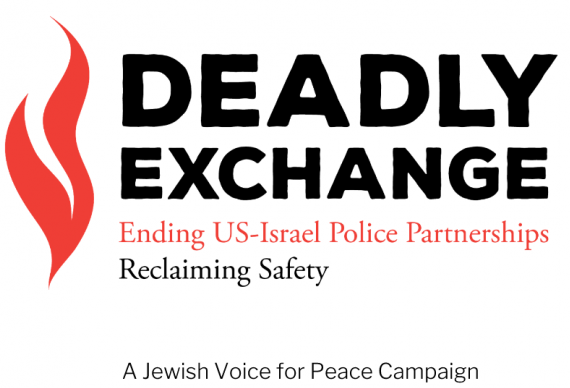
Launched several years ago by the anti-Zionist, fringe, and radical JVP, the campaign essentially blames Israel and major American-Jewish organizations like the ADL for police brutality and racist policing policies in U.S. minority communities, including police shootings and militarization, that are allegedly “learned” via week-long counterterror seminars in Israel.
In essence, as has been noted by others (see, for example, here and here), the campaign sets up Israel and American-Jewish organizations as part of, and the driving force behind, a white supremacist power structure oppressing people of color, including Palestinians and Americans in U.S. inner cities. JVP is basically alleging that mainstream organizations of American Jewry are co-conspirators with Israel in some dark mission to harm U.S. citizens, including African-Americans, Native-Americans and other minorities, and immigrant communities.
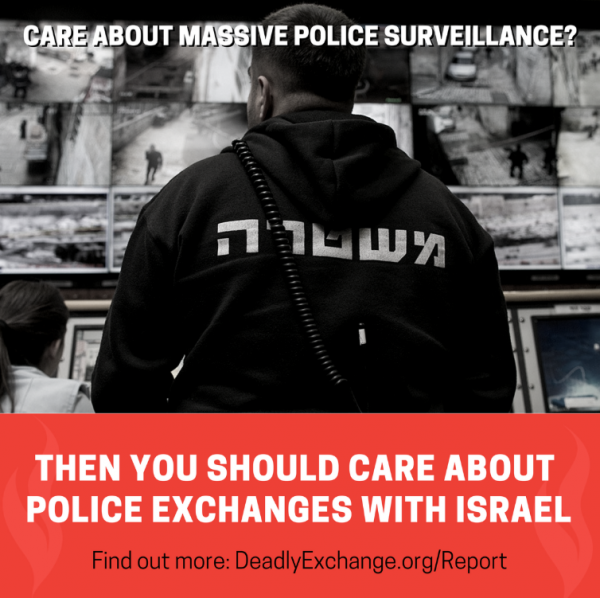
As we discussed, this campaign is now being heavily promoted by many pro-BDS organizations, who are working to advance it in city councils and other local agencies. JVP-led coalitions have now been successful in several municipalities (Durham, NC, Vermont, and Northampton, Mass.), although quick mobilization by grassroots pro-Israel activists stymied their efforts in at least one place (Rhode Island):
- Demonization: Durham NC City Council bans police exchanges with Israel.
- Update: Durham NC Pro-Israel groups organize against City Council ban on police exchanges with Israel
- Durham rejects recommendation to revise anti-Israel police policy
- More Demonization: Jewish Voice for Peace leading effort to ban DC police training in Israel
- Anti-Semitic “Deadly Exchange” campaign can be defeated when local pro-Israel groups respond quickly
The NOBLE and GCOAIC “fully encourage and support” U.S.-Israel law enforcement programs
Like many of the other statements denouncing “Deadly Exchange” that have been issued in recent weeks, those released by the National Organization of Black Law Enforcement Executives (NOBLE) and the Georgia Council on American Indian Concerns (GCOAIC) specifically applaud the Georgia Law Enforcement Exchange (GILEE) for enhancing U.S. law enforcement leadership and homeland security by organizing professional educational trainings for chief U.S. law enforcement officials with counterparts in Israel and other countries.
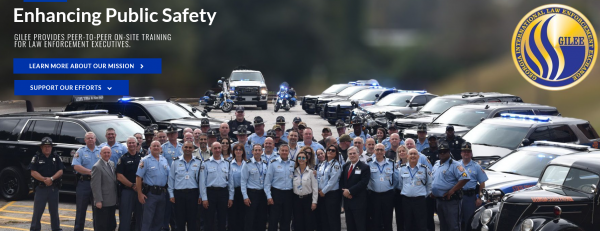
Housed at Georgia State University’s Andrew Young School of Policy Studies, since its founding in 1992 GILEE has provided nearly 500 inter-agency training programs for more than 1,700 graduates (along with special briefings to over 33,000 law enforcement officers).
But for the last decade, as we described in our prior post, this university-based criminal justice program has been subjected to ugly and relentless attacks by Atlanta BDS groups, who have partnered with student organizations to remove it from the campus on account of its exchange programs in Israel.
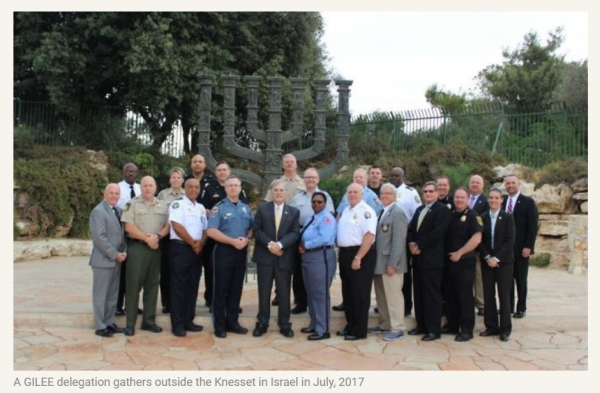
[Credit: GILEE; posted with permission]
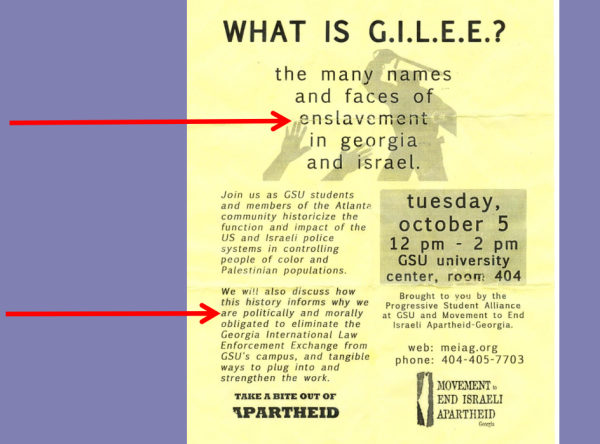
The NOBLE and GCOAIC statements offer full support and backing to GILEE while also highlighting the benefits to public safety offered by police exchange programs, including with Israel.
The NOBLE statement
Founded in 1976, NOBLE self-describes as the “conscience of law enforcement by being committed to justice by action”. This nationally-recognized organization of law enforcement officials represents over 3,000 members, who are “primarily African-American chief executive officers of police agencies at the federal, state, county and municipal levels.” It also represents criminal justice practitioners.
The NOBLE statement is short and focuses solely on GILEE, praising it for enhancing “law enforcement leadership development and homeland security” and for working “continuously to improve public safety.”
According to its statement,
NOBLE members throughout the country have benefited from programs developed and sponsored by GILEE. NOBLE applauds the work of GILEE in promoting the professional development of law enforcement executives.”
The GCOAIC statement
Created by Georgia’s legislature in 1992, the GCOAIC is the only state entity “specially authorized to address the concerns of Georgia’s American Indians” including economic development, preservation of cultural heritage such as graves and burial objects, and consultation with state and local government bodies.
Like the NOBLE statement, the GCOAIC document also praises GILEE for its continuous efforts to provide “peer-to-peer training based on community policing principles” and to
improve public safety by enhancing inter-agency cooperation, partnership and professional educational training among the world’s top law enforcement communities, most recently Israel and Hungary.”
The GCOAIC also goes even further to explicitly lambast the “Deadly Exchange” campaign:
The Council on American Indian Concerns commends GILEE on its work to promote the professional development of law enforcement executives. The Council completely rejects anti-police and anti-Israel false claims that programs like GILEE amount to ‘deadly exchange.’ We fully encourage and support state, local and tribal agencies to participate in GILEE programs.”
Significance of the NOBLE and GCOAIC statements opposing the “Deadly Exchange” campaign
The NOBLE statement is a huge rebuke to JVP and its “Deadly Exchange” because its a statement issued by black law enforcement officials and so calls into question the key premise of the campaign: that U.S.-Israel law enforcement exchange programs harm minorities, especially African-Americans. This is so even though the statement doesn’t specifically mention “Deadly Exchange” by name. By providing full support to GILEE, NOBLE is indicating its intention to continue professional exchanges in Israel for American black law enforcement executives, who while there receive educational training to better serve citizens in the U.S., including African-Americans.
The NOBLE statement is also important to the effort to combat “Deadly Exchange” because condemnation from this group directly challenges JVP’s attempt to exploit racial tensions in the U.S. by holding Israel accountable for policing problems in African-American communities, Exposed: Years-long effort to blame Israel for police shootings of blacks.
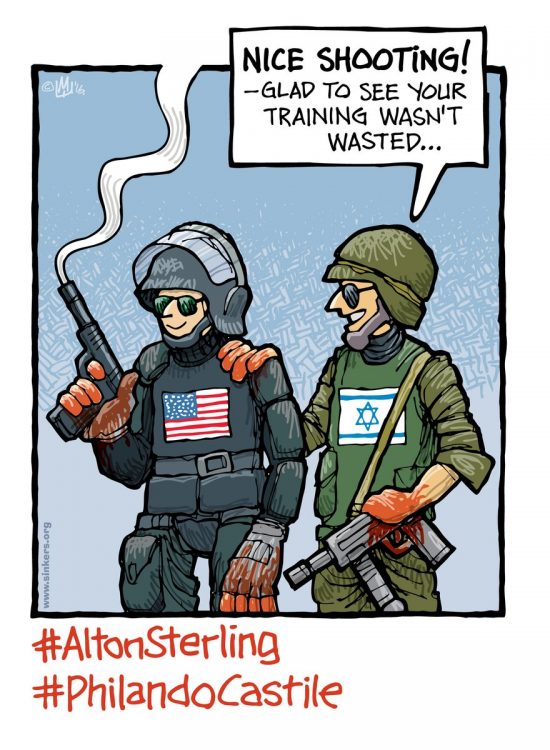
Specifically, the NOBLE statement undermines the “Ferguson to Palestine” meme that is the foundation for the “Deadly Exchange” campaign. Long before JVP launched its campaign, this meme was already capitalizing on the Black Lives Matter movement through an intersectional paradigm in which Amerian blacks have been portrayed as oppressed by Israel and an American police force made up of whites (see the cartoon above) in the same way that Israel, dominated by an alleged white supremacist power structure, has been presented as the source of problems for Palestinians (cast according to the meme as people of color).
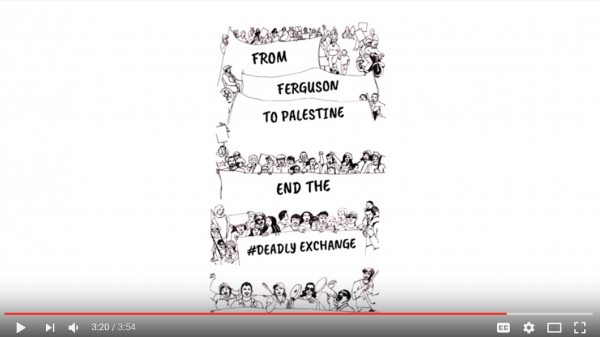
[JVP Deadly Exchange Video | YouTube screenshot]
As noted recently by pro-Israel blogger Elder of Ziyon,
There is nothing remotely racial about the conflict between Israel and the Arab world, including Palestinians. After all, half of Israelis have some heritage from northern African and Middle Eastern communities and are indistinguishable from Arabs…If skin pigmentation is your criterion, there are roughly 100,000 Israelis from Ethiopia who are darker than virtually any Palestinian Arab. Yet they are considered ‘white’ by the bizarre logic of those who want to paint this as a racial justice issue.”
If the NOBLE statement discredits JVP’s attempt to present the Israeli-Palestinian conflict as a “racial justice issue”, then the GCOAIC statement undermines the intersectional alliance that “Deadly Exchange” has also attempted to forge with Native Americans:
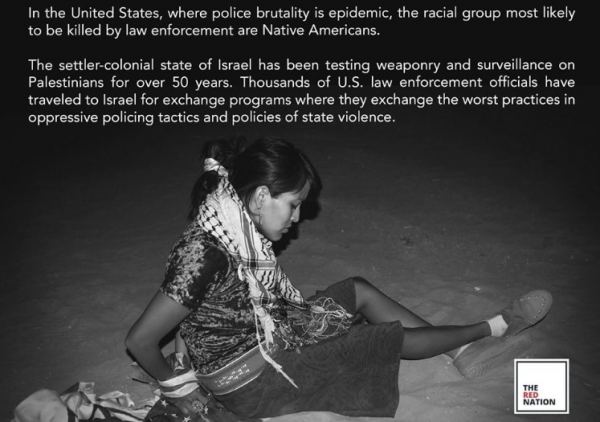
In fact, by highlighting the value of U.S.-Israel police exchanges and rejecting “anti-Israel false claims”, the GCOAIC is directly challenging groups like The Red Nation, which provided JVP with an early endorsement.
Back in July 2017, a lead organizer with The Red Nation Melissa Tso even wrote a laudatory essay for the campaign. In it she linked the “experiences of indigenous peoples of Palestine and North America” to the “mass injustice” and “incarceration” meted out by “imperialist forces” and called for “solidarity between Natives and Palestinians” as “crucial to combat[ing] the state violence on their own homeland.”
By explicitly rebuking “Deadly Exchange” its pretty clear that the GCOAIC doesn’t share Tso’s or Red Nation’s virulent anti-Israel sentiments.
Bottom line: JVP had long tried to hoodwink people into thinking that it has wall-to-wall support from U.S. minority communities for its heinous “Deadly Exchange” campaign. That’s precisely why the NOBLE and GCOAIC statements are so important. Taken together, they’re rejoinders from the African-American and Native-American communities to the cockamamie “Deadly Exchange” accusations being made by members of those same communities.
Conclusion
Last Thursday, GILEE’s founder and director Prof. Robert R. Friedmann received yet another statement of support for his law enforcement exchange program.
The statement, provided by the Forsyth County Board of Commissioners in “Support of Georgia International Law Enforcement Exchange (“GILEE”) at Georgia State University’s Andrew Young School of Policy Studies”, is longer and more detailed than the other documents supporting GILEE that have been released.
So far, the Forsyth County Board of Commissioners is the only government body to have released an official statement that explicitly denounces “Deadly Exchange”.
The 4-page document is a good overview of the benefits to the U.S. public from international inter-agency cooperation between police agencies. But the best part comes at the end, where the Board of Commissioners slam “Deadly Exchange”:
WHEREAS, anti-police and anti-Israel groups launched a propaganda campaign against U.S. police training in Israel under the misnomer of ‘Deadly Exchange.’ This campaign falsely claims that American officers learn police tactics in Israel which they apply in the U.S. to shoot to kill and to oppress minorities…
BE IT FURTHER RESOLVED that the Forsyth County Board of Commissioners flatly rejects claims that these professional training programs are being used to train law enforcement in tactical or military operational techniques designed to oppress or kill minorities or other members of the community. Not only do such claims lack any foundation in the facts or histories of such exchanges, but the inflammatory causal attribution that such training leads to deadly encounters in the U.S. is utterly fallacious and slanderous. The Forsyth County Board of Commissioners unequivocally condemns such campaigns.”
You can watch Friedmann being presented with a copy of the resolution in this 7-minute video taken at the Commissioners’ meeting, where he was accompanied by graduates of his program:
It’s a well-deserved honor for Friedmann, for which he, the Andrew Young School of Policy Studies, and Georgia State University can all be proud.
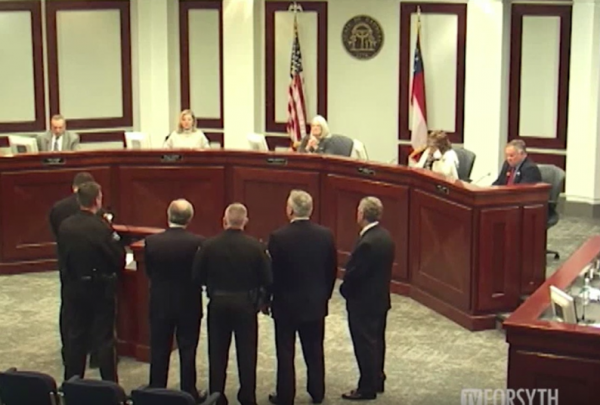
[Founder and Director Robbie Friedmann receives resolution in support of GILEE | Forsyth County Board of Commissioners | February 21, 2019 | YouTube screenshot]
Miriam F. Elman is an Associate Professor of Political Science and the Inaugural Robert D. McClure Professor of Teaching Excellence at the Maxwell School of Citizenship & Public Affairs, Syracuse University (SU). She is the editor of five books and the author of over 65 journal articles, book chapters, and government reports on topics related to international and national security, religion and politics, and the Israeli-Palestinian conflict. She also frequently speaks and writes on the Boycott, Divestment, and Sanctions (BDS) anti-Israel movement. Last year, Elman was included on the Algemeiner newspaper’s list of the top 100 people worldwide who are “positively influencing Jewish life.” Recently, she was appointed the Executive Director of the Academic Engagement Network, a position she will assume while taking a leave of absence from SU. Follow Miriam Elman on Facebook and Twitter @MiriamElman
Donations tax deductible
to the full extent allowed by law.








Comments
National white law enforcement association, congressional white caucus. Sounds like a racist organization no? That’s because it is.
They are persistent legacies of diversity or color judgments.
A “White Law Enforcement Association” would indeed be racist and unacceptable, because there is no “white” identity or ethnicity. But nobody objects to the Irish-American Police Officers’ Association, or the various Italian-American police groups, the Shomrim Society (Jewish cops), or the Gay Officers’ Action League, and neither should anybody object to this group. Because black cops, just like Irish, Italian, Jewish, or gay cops, have obvious common interests that can be advanced by coming together.
My issue with your rudeness and incivility is not a generalization whatsoever. It is quite specific to you as an individual.
Not that I have any patience with generalizations in general. I’m quite happy to deal with people of all races and creeds as individuals. This is why I try to hold myself to a civil standard, because, after all, people are watching.
Excellent points, JB. I’m not a huge fan of generalizations, either, but it’s crazy to think we can somehow edit them out of our thinking or public discourse. You can’t be a feminist and not have a generalized idea about gender, about men and women. You can’t be an SJW loon without having a generalized view of minorities who deserve justice. You can’t be a #MeToo advocate without generalizing that “all women should be believed.” You can’t be a conservative without generalizing that all people want and deserve freedom.
Generalizations are incorrectly damned in our current socio-cultural climate. As long as thinking people understand that a generalization is a generalization, then there is no problem. The problem occurs when we dumb-down education and teach people that generalization is blanket bad because it is a dog whistle (Rags’ point) or somehow really means that ALL people of that type (all blondes are dumb, and etc.) fit that mold. Normal, thinking people know better, but we are raising a generation of seriously abnormal people for whom the idea that a generalization doesn’t actually mean every single person in that group is beyond their grasp.
Due to some HTML/ browser vagary, I can’t directly reply to Fuzzy’s last comment. Long subject, but I need to keep it short: if we’re not allowed to separate individual from group, or to allow speech about “some” as opposed to “all”, the language gets stupider. Politics is forcing “some” out of existence, and ideology is attempting to erase the individual: you are not an individual, you are part of a group, therefore you must sit and play your assigned role, the end. This is making discourse stupider.
But… and here was my original point… the answer to this is to resist bad generalizations, the ones that demean and coarsen discourse… without demeaning and coarsening discourse even more in the process. If you are… you know what you’re doing, so why should I view you as a tragic hero…?
The “National Organization of Race Law Enforcement Executives”; you’re kidding right?
They really wanted to be able to call it NOBLE for short, I guess.
I probably should have put the word ‘race’ in italics.
Rags-Rump, are you black? Are you an example of entitlement minded blackness?
We do not know or really care about race here, we do care about content of what someone has to say, and how they say it.
Sometimes you get content right, but most of the time your presentation sucks.
Just give it up and maybe live a little longer with lower blood pressure, Rags.